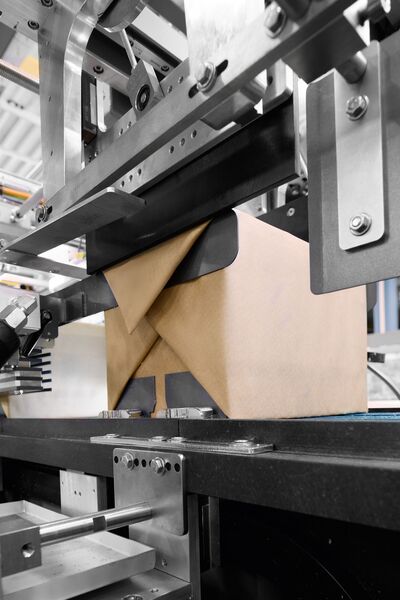Paper not film: KHS launches secondary packaging system for cans

The idea of using paper as a secondary packaging is not new; KHS first experimented with this around 20 years ago. Back then, this technology didn’t catch on; however, as paper was a cost-intensive raw material and wrapping containers in film yielded better results, the beverage industry thus opted for different systems and solutions.
But in today’s world, customers demand alternatives to the usual packaging systems such as film and these should be as eco-friendly as possible. To meet this demand, KHS Group has added a further environmentally friendly system to its portfolio. With its Innopack Kisters tray packers, the systems supplier now enables cans of food and beverage to be wrapped in paper. The new technology provides an alternative to shrink film or wraparound cartons. Regarding stability the results are the same, yet compared to cardboard, costs are lower as less energy and fewer materials are used. With a few minor adjustments existing machines can also be converted to this new set-up. This type of pack can replace shrink film or wraparound carton packaging for transportation or sale on packs of 12 or 24 cans in the high-capacity range of up to 90,000 cans per hour.
Wrapping cans in paper has many advantages over other materials:
- Paper is kinder to the environment than film with respect to ocean pollution, as paper biodegrades in the environment after a few weeks.
- Fewer packaging materials are used. Instead of a sturdy wraparound carton or film packs on trays, packaging cans in thinner paper only needs a flat, stable corrugated card pad as a base — with identical results regarding stability.
- Costs are cut by the new paper pack, compared to a wraparound carton, by up to 15%, with outgoings about the same as for film. Overheads are also reduced by the low energy consumption of about 14 kWh an hour at 80 cycles a minute.
- Package hygiene and integrity is improved as the folding process is such that the pack is fully enclosed. In contrast, dirt can get into film packs with small side openings; paper full wrap has the advantage when it comes to protecting the cans from soiling.
- By adding secondary paper packaging, it is possible to reach out to new target groups at the point of sale with attractive product presentations. It is also possible to choose between printed or unprinted, new or recycled standard paper qualities as packaging material (usually 80 g/m² or 100 g/m²).
In order to wrap cans in paper instead of film just a few adjustments are needed to the Innopack Kisters tray packer. KHS Group is increasingly supplying modular systems and solutions that enable and ease the appropriate conversions of machines. In this case, KHS has simply re-engineered the process module for folding and wrapping. The standard components such as tray separation from the magazine, gluing or can feed are identical to KHS machines already on the market. This allows beverage producers to have the tray packers already in operation at their plants converted simply by adapting certain modules, making a full new investment unnecessary.

Solving the limitations for paper packaging with coating strategy
Paper can provide a sustainable packaging alternative, but its poor resistance to water and oil...
Keeping PEZ tablets rolling consistently with print upgrade
PEZ confectionery has been enjoyed for generations with its collectible dispensers, but behind...
Food loss vs packaging waste, global position paper released
The Navigating the Food Loss & Waste Paradox paper explores the balance between food...










